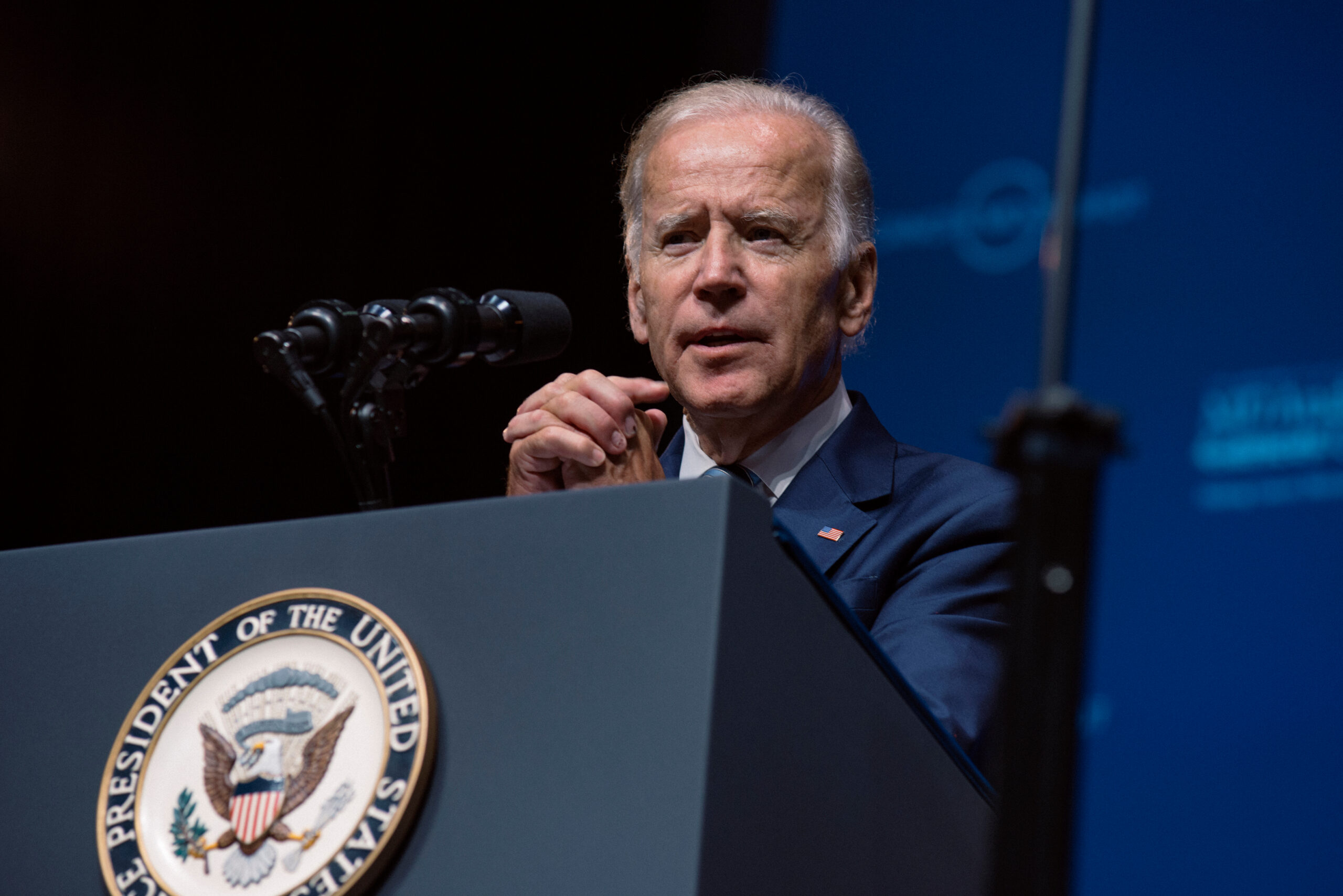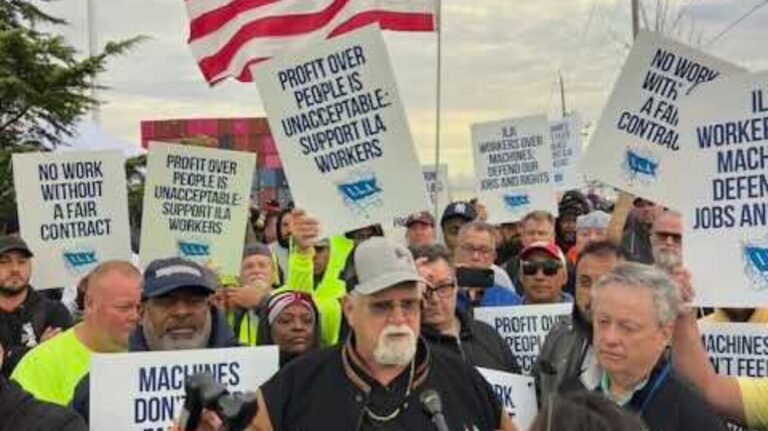In a statement from the White House on 1 October 2024 – the day port workers along the East and Gulf Coasts of America began to strike over ‘wages and benefits’ – US president Joe Biden said that he has urged the United States Maritime Alliance (USMX) to “come to the table and present a fair offer to the workers of the International Longshoremen’s Association (ILA)”.
This offer, Biden said, should ensure that these workers are “paid appropriately in line with their invaluable contributions”.
This comes after an agreement between the USMX and the ILA failed to be reached before the expiration of the previous Master Contract Agreement on 30 September, prompting concerns that a strike could disrupt supply chains.
With no resolution having come before 1 October, ILA president Harold J Daggett joined “thousands of fellow members outside the gates at Maher Terminal in Port Elizabeth, New Jersey”, as the first coast-wide strike in nearly half a century began.
According to the ILA, “tens of thousands of ILA members” formed picket lines along “all the major ports on the Atlantic and Gulf Coasts”, with the demonstrations set to continue “round the clock, 24/7, for as long as it takes for the USMX to meet the demands of ILA rank-and-file members”.
Daggett declared: “We are now demanding a US$5-an-hour increase in wages for each of the six years of a new ILA-USMX Master Contract. Plus, we want absolute airtight language that there will be no automation or semi-automation, and we are demanding all Container Royalty monies go to the ILA.”
In his statement on 1 October, president Biden said: “Collective bargaining is the best way for workers to get the pay and benefits they deserve.”
He went on to say: “Ocean carriers have made record profits since the pandemic and in some cases profits grew in excess of 800% compared to their profits prior to the pandemic. Executive compensation has grown in line with those profits and profits have been returned to shareholders at record rates. It’s only fair that workers, who put themselves at risk during the pandemic to keep ports open, see a meaningful increase in their wages as well.
“As our nation climbs out of the aftermath of Hurricane Helene, dockworkers will play an essential role in getting communities the resources they need. Now is not the time for ocean carriers to refuse to negotiate a fair wage for these essential workers while raking in record profits. My administration will be monitoring for any price gouging activity that benefits foreign ocean carriers, including those on the USMX board.
“It is time for USMX to negotiate a fair contract with the longshoremen that reflects the substantial contribution they’ve been making to our economic comeback.”

The US Department of Labor’s acting secretary of labor, Julie Su, seemed to echo this sentiment, saying: “Over the last week and more, I have spent hours on the phone and in meetings with the parties urging them to find a way to reach a fair contract. This country’s port workers put their health and safety on the line to keep working through the pandemic so we could get the goods we needed as Covid raged and these workers will help communities recover from the devastating effects of Hurricane Helene.
“As these companies make billions and their CEOs bring in millions of dollars in compensation per year, they have refused to put an offer on the table that reflects workers’ sacrifice and contributions to their employer’s profits.”
Also commenting on the negotiations on 1 October, a USMX statement read: “Our industry directly supports hundreds of thousands of jobs in the United States and is a significant economic driver for the US economy and families across the country. USMX is proud of the wages and benefits we offer to our 25,000 ILA employees, and strongly supports a collective bargaining process that allows us to full bargain wages, benefits, technology, and ensures the safety of our workers, day-in and day-out.
“We have demonstrated a commitment to doing our part to end the completely avoidable ILA strike. Our current offer of a nearly 50% wage increase exceeds every other recent union settlement, while addressing inflation, and recognising the ILA’s hard work to keep the global economy running. We look forward to hearing from the union about how we can return to the table and actually bargain, which is the only way to reach a resolution.”

The ILA responded to this statement, claiming that it “distorts the facts and misleads the public”, and noting that the union had rejected the proposed wage increase because it “fails to address the demands of [ILA] members adequately”.
It claimed that the USMX statement “conveniently omits that many [ILA] members are operating multi-million-dollar container-handling equipment for a mere $20 an hour”.
The impact of the strike on supply chains has been a key concern, with analysis from JP Morgan suggesting that it could cost the American economy $5 billion per day.
According to data provided to Logistics Manager from supply chain visibility platform FourKites, “Long Beach and Los Angeles ports are already experiencing the impacts of the ILA strike, reporting an 18% increase in volume last month.”
Spencer Shute, vice president at procurement and supply chain consultancy Proxima, shared his insight: “The labour strikes at East Coast and Gulf Coast ports are generating considerable discussion, but their actual impact on the supply chain for the peak holiday season may be less severe than anticipated. Most holiday merchandise is already in the US, so while concerns about delays exist, many shipments for the holiday rush have already made it through.
“The immediate impact will likely be felt by manufacturers reliant on these ports for parts in sectors like automotive and industrial production. Consumers may experience shortages of perishable goods, such as bananas, with a fifth of the US banana supply coming through these ports, potentially driving up prices.”
The impact of the strike has been recognised by global shippers like Maersk, which issued an update as the strike began saying: “We acknowledge this situation’s challenges and assure you that we are diligently working and implementing contingency plans.”
Following the undeniable success of IntraLogisteX 2024 in the UK, the exhibition is heading across the Atlantic later this month, with IntraLogisteX USA taking place on 22-23 October 2024 at Miami Beach Convention Center.
Click here for more details and to register!
Plus, the Supply Chain Excellence Awards are also heading stateside as Miami welcomes the very first Supply Chain Excellence Awards USA on 21 October 2024.
For more information about the awards, categories and how to enter, click here!







